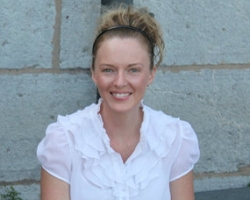a very cool thing happened yesterday. my plastic surgeon's office called and asked if i would be willing to speak with a women who had chosen to use him as her plastic surgeon for her reconstruction. i of course agreed, because any information i could share about my personal experience to help ease the anxiety of someone else is empowering to them and also healing for me as well.
about an hour later, this female called me and we chatted for about a half an hour. like me, she had already spent hours researching her stuff and knew what type of questions to ask. i was able to give her my personal experience side of things and some tips on what to expect and how to prepare for possible complications. she was very grateful and we both felt very good after our conversation. i got her email after, and shared some further information and links with her.
a., if you are reading this, thank you so much for talking with me. i wish you all the best and as i mentioned, i am here for you as much as i can be for someone who does not drive;) i hope speaking with me will help take some of the anxiety and feeling of not knowing away. i commend you for being proactive with your health and doing what 'needs to be done' for your kids and family.
on a separate note, i have not shared my family's brca gene testing results yet. it's been a few months since we received our result and i didn't know how to process it. genetic testing was done on my mother's mother's side of the family, and as of yet i have not shared the results with you guys. well here are the results.
brca2 mutation - unknown significance.
still don't know what to make of this. i don't know if i have this particular brca2 mutation because they will not test related family members when it is a mutation of unknown significance.
so, i am still glad i went forward with my pbm and didn't wait around for results. i am glad i made my mind up before any possible results.
as for this result. it has been graded as possibly going either way. the genetics counselor said to check in once a year to see if any further information comes to light which would indicate whether or not our particular mutation is harmful or not...or lets just say whether it is what is causing our familial cancers or not.
so here is the slippery slope. some scattered cancers have appeared here and there on my mother's father's side. to date, there has been a young breast cancer on his side, my mom's father has had prostate cancer (treated and in remission), her uncle had lung cancer, and now within the past few weeks another one of her uncles (my great uncle) has been diagnosed with the dreaded pancreatic cancer.
so now i have the nagging fear that maybe there a genetic defect on the other side too. at this stage of the game, i am sure there is nothing to be done. i do not think this side has any interest in genetic testing and does not at this stage see a need for it because there are not as many cancers on this side in comparison to my grandmother's side.
i guess all i can do for now is give the updated information to my genetic counselor and let her make sense of it. but damn, this cancer stuff sucks! nothing like getting those phone calls that another family member has cancer.

 So much has happened in a year. I moved. I started school. I met tons of great new people. And I became a Nurse. I graduate in 4 months and will soon embark on a new career in the nursing profession. Life is so full of promise...not something I could say 2 years ago when my life was full of fear and anxiety over breast cancer. Fear over finding more lumps. Fear over having more biopsies. Fear of the results. Fear I wouldn't see the next 10 years. Fear that I would have to go through chemotherapy or radiation. Fear that I would leave my family behind. Fear that I would suffer the same fate as my mother.
So much has happened in a year. I moved. I started school. I met tons of great new people. And I became a Nurse. I graduate in 4 months and will soon embark on a new career in the nursing profession. Life is so full of promise...not something I could say 2 years ago when my life was full of fear and anxiety over breast cancer. Fear over finding more lumps. Fear over having more biopsies. Fear of the results. Fear I wouldn't see the next 10 years. Fear that I would have to go through chemotherapy or radiation. Fear that I would leave my family behind. Fear that I would suffer the same fate as my mother. I am so lucky, with the support of family, friends (shout out to my bestie: Elaine), organizations like Force and Bright Pink and my beloved BRCA bosom buddies like Michele, Teri, Shari, Megan, Claudia, Rebecca, and Robyn to name a few, and an outstanding Health Care Team that I was able to become empowered and take control of my future. Be in charge of my fate. Face my risk of breast cancer head on and make the empowering decision not only to have a PBM, but to share my experience and empower others along the way.
I am so lucky, with the support of family, friends (shout out to my bestie: Elaine), organizations like Force and Bright Pink and my beloved BRCA bosom buddies like Michele, Teri, Shari, Megan, Claudia, Rebecca, and Robyn to name a few, and an outstanding Health Care Team that I was able to become empowered and take control of my future. Be in charge of my fate. Face my risk of breast cancer head on and make the empowering decision not only to have a PBM, but to share my experience and empower others along the way. What a remarkable journey it has been. A journey that has shaped me into the person I am today. Strong. Vibrant. And full of Life! Baby, I'm a Firework!!!
What a remarkable journey it has been. A journey that has shaped me into the person I am today. Strong. Vibrant. And full of Life! Baby, I'm a Firework!!!
















